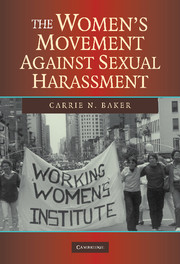Book contents
- Frontmatter
- Contents
- Figures
- Acknowledgments
- Organizational Abbreviations
- Introduction: Enter at Your Own Risk
- PART I RAISING THE ISSUE OF SEXUAL HARASSMENT
- 1 Articulating the Wrong: Resistance to Sexual Harassment in the Early 1970s
- 2 Speaking Out: Collective Action against Sexual Harassment in the Mid-1970s
- 3 A Winning Strategy: Early Legal Victories against Sexual Harassment
- PART II GROWTH OF A MOVEMENT AGAINST SEXUAL HARASSMENT
- PART III THE MOVEMENT'S INFLUENCE ON PUBLIC POLICY
- Conclusion: Entering the Mainstream
- Appendix A Time Lines of Significant Events
- Appendix B Glossary of Select Cases
- Notes
- Bibliography
- Index
1 - Articulating the Wrong: Resistance to Sexual Harassment in the Early 1970s
from PART I - RAISING THE ISSUE OF SEXUAL HARASSMENT
Published online by Cambridge University Press: 14 June 2019
- Frontmatter
- Contents
- Figures
- Acknowledgments
- Organizational Abbreviations
- Introduction: Enter at Your Own Risk
- PART I RAISING THE ISSUE OF SEXUAL HARASSMENT
- 1 Articulating the Wrong: Resistance to Sexual Harassment in the Early 1970s
- 2 Speaking Out: Collective Action against Sexual Harassment in the Mid-1970s
- 3 A Winning Strategy: Early Legal Victories against Sexual Harassment
- PART II GROWTH OF A MOVEMENT AGAINST SEXUAL HARASSMENT
- PART III THE MOVEMENT'S INFLUENCE ON PUBLIC POLICY
- Conclusion: Entering the Mainstream
- Appendix A Time Lines of Significant Events
- Appendix B Glossary of Select Cases
- Notes
- Bibliography
- Index
Summary
Resistance to sexual harassment emerged in the form of several lawsuits filed around the country, under Title VII of the Civil Rights Act of 1964. Sexual harassment litigation was a battleground on which traditional notions that women belonged in the private sphere and entered the public sphere at their own risk struggled with feminist notions that women were entitled to participate fully in the public sphere. Since the founding of the United States, the law enforced male dominance and female subordination by excluding women from the public sphere of the marketplace and government and refusing to intervene in disputes arising in the domestic sphere. Women could not vote, serve on juries, or testify in court. Under the legal doctrine of coverture, inherited from English common law, a woman's legal identity merged into her husband's upon marriage. Married women could not control their property, sue or be sued, or enter into a contract in their own names, and a woman's husband controlled any wages she earned. The doctrine of marital unity also gave men control over their wives’ bodies so the state rarely interfered in ongoing family relationships, even in cases of battery and rape.
By custom, as well, women were largely excluded from public life. In the early nineteenth century, the social ethic of domesticity shaped the lives of white middle-class women, excluding them from participation in the workplace. The ideology of domesticity distinguished between home – the locus of tranquility, rest, and familial love associated with women – and the public life of business and politics associated with men. This ideology, however, often did not reflect the lives of poor women and women of color, who had no choice but to work outside of their homes. Many women, as domestic servants in particular, straddled the line between the public and the private spheres. The influence of this ideology of domesticity on the law, however, powerfully shaped all women's lives by limiting women's participation in the public sphere and denying legal relief for harms arising in the private sphere.
Courts in the United States consistently used the public/private ideology when adjudicating legal cases brought by women.
- Type
- Chapter
- Information
- The Women's Movement against Sexual Harassment , pp. 11 - 26Publisher: Cambridge University PressPrint publication year: 2007



